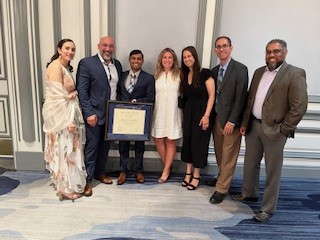Neurocritical Care Fellowship
Program Director: Lauren Ottenhoff, D.O.

About the Program
The Neurocritical Care fellowship is a one to two-year training program that fulfills the ACGME Neurocritical Care training criteria. The curriculum is equally balanced between neurological and medical aspects of critical care. Training is based in the 16-bed Neuro-ICU at Henry Ford Hospital downtown campus.
We have a team of six fellowship-trained neurointensivists, with neurocritical care advanced practice providers and residents that staff the unit 24 hours a day. Fellows will gain proficiency in the medical management of the critically-ill patient. We place particular emphasis on multimodality monitoring. Procedural skills include: traditional and ultrasound-guided central venous line placement, arterial line placement, lumbar puncture/drains, continuous EEG monitoring, brain oxygen monitoring, ventriculostomy management, endotracheal intubation, ventilator management and fiberoptic bronchoscopy. In addition to time spent in the Neuro-ICU, fellows will complete required rotations in the medical intensive care unit (MICU), surgical intensive care unit (SICU), cardiac intensive care unit (CICU) and Anesthesia (OR). Fellows can choose from a variety of elective rotations to further enrich their fellowship experience.
Quick facts
- 1 to 2 year ACGME accredited fellowship program. Duration will depend on prior credentials.
- 16-bed Neuro ICU
- 8-bed step-down unit
- 900-1000 admissions per year
- Team consists of an attending, a fellow, a nurse practitioner, residents from Neurology, Neurosurgery and Emergency Medicine, a pharmacist, and fellows from other critical care programs.
- We are one of the largest tertiary centers in Detroit with a wide catchment area that covers the metro region and beyond.
Diverse pathology
- Subarachnoid hemorrhage
- Intracerebral hemorrhage
- Various neurosurgical disorders and post-operative care
- Cerebral edema
- Status epilepticus
- Ischemic stroke, including post-thrombectomy care
- Neurotrauma, including brain and spine injuries
- Intense critical care training on the management of individual and multi-organ failure, sepsis and general management of critically ill patients
Equipment
Extensive use of:
- ICP monitors, including brain oximetry
- Ventriculostomy and lumbar drains
- Continuous EEG monitoring
- Transcranial Dopplers
- Hemodynamic monitoring (both invasive and non-invasive)
- Mechanical ventilation
- Bronchoscopy
- Central venous catheters
- Arterial lines
Rotations
The curriculum is split equally between NeuroICU rotations and non-NeuroICU rotations.
Non-NeuroICU rotations include:
- OR and ICUs
- Anesthesia and advanced airway management
- Medical ICU (MICU)
- Surgical ICU (SICU), including trauma
- Cardiovascular ICU (CVICU) and Heart Failure service
- Neurosurgery
- Bronchoscopy
- Consult services
- Nephrology
- Infectious Diseases
- Neurology services
- EEG, including long-term EEG reading and interpretation
- Stroke service
- NeuroICU consults
- Neuroradiology
- Transcranial Dopplers, including performing and interpreting
- Research blocks: this time is protected for fellows to work on and complete their own research project, a requirement by the program. Click here for more detail on Research in the NeuroICU.
Upon completion, fellows will have the knowledge base and clinical skills to care independently for a broad range of critically ill patients, both in the Neuro ICU and beyond.
Message from the Program Director
 “Welcome to the Neurocritical care fellowship at Henry Ford Hospital in Detroit! We have been training fellows since 2008. We are a ACGME-accredited program that offers two positions per year.
“Welcome to the Neurocritical care fellowship at Henry Ford Hospital in Detroit! We have been training fellows since 2008. We are a ACGME-accredited program that offers two positions per year.
Our 16-bed neurocritical care unit attracts complex neurosurgical and neurological cases from the metro Detroit and all over Michigan. We are a busy level 1 trauma center, a certified comprehensive stroke center and a pole of research activities. We routinely participate in multicenter national and international studies and place a great emphasis on multimodality neuromonitoring to tap into the black box the brain represents. Our Neuroscience Institute owes its reputation of excellence in part to the close and collegial bond that exists between our neurologists and neurosurgeons.
Our NeuroICU fellows are the cornerstone of our unit and the focus of our tripartite mission: patient care, education and research. Not only do they provide compassionate and excellent patient care, they also play an active role in the evolution and betterment of their fellowship. The fellowship has undergone some recent transformations with the implementation of a structured didactics series, including weekly CME lectures, monthly journal clubs/M&M and an integrated research curriculum, in line with the academic mission of the Neuroscience Institute.
I hope you consider Henry Ford Hospital as the next stepping stone in your exciting journey in Neurocritical Care and wish you all the best in your future careers!”
.svg?iar=0&hash=F6049510E33E4E6D8196C26CCC0A64A4)
/hfh-logo-main--white.svg?iar=0&hash=ED491CBFADFB7670FAE94559C98D7798)